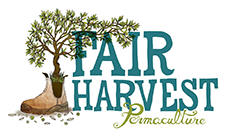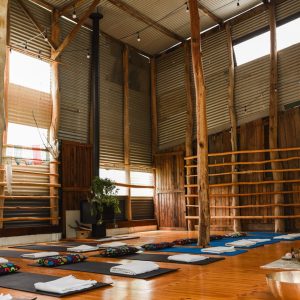What is Permaculture?
Is a very frequent question asked by visitors and one that I always have to think about.
Permaculture is incredibly simple but as it applies to just about every part of our lives it’s applications are broad and diversified.
I always like to start with the 3 ethics
Care for the Earth
Care for the People
Share Resources
Have a good think about these ethics and you will see how they can be applicable to your home, your garden, your family, farm and community.
Bill Mollison and David Holmgren developed the ethics and principles in the 70’s in response to some of the environmental issues that were affecting people at the time. Surprisingly these same questions are ones that we are still addressing today; pollution, chemical agriculture, population density, clear felling of native forests, monoculture, water quality etc
As an environmental activist, what I loved about Permaculture is that it offered a positive way forward, so that while my friends and I were protesting the environmental catastropies of the 90’s (particularly the devestating forest management of Western Australia’s Karri and Jarrah ), we could find solace in planting trees, growing food and nurturing the earth.
This planted the seed to delve further into how Permaculture could offer solutions towards a more sustainable future.
“Though the problems of the world are increasingly complex, the solutions remain embarrassingly simple.” ―
The Principles of Permaculture are design principles that can be applied to home, garden, farm and even community design. They have been developed from careful observation of healthy ecosystems and modified over the years to the succinct and applicable principles that are taught globally today.
Principles of Permaculture
- Observe and Interact
- Catch and Store Energy
- Obtain a Yield
- Apply Self-regulation and Accept Feedback
- Use and Value Renewable Resources and Services
- Produce no Waste
- Design from Patterns to Details
- Integrate rather then Segregate
- Use Small and Slow Solutions
- Use and Value Diversity
- Use Edges and Value the Marginal
- Creatively Use and Respond to Change
Below are a few ways that we have put these principles into action at Fair Harvest
1 Observe and Interact
By Observing the health and productivity of our bee hives we can Interact by harvesting honey just at the right time for the well being of the hives.
2 Catch and Store Energy
Trees capture sunlight and turn it into carbon energy that can be burnt to release heat energy or here, in our Hugelkulture bed they are used to build soil for veggie beds.
3 Obtain a Yield
Obtaining a yield from our farm and garden is a great joy and one that we love sharing with friends and family. This is what many of our Permaculture students are seeking…. a productive and abundant system.
4. .Apply Self Regulation and Accept Feedback
Nothing gives better feedback than the health of the soil and the plants and animals that grow on it. By observing and recording growth we can use feedback towards better management.
5. Use and Value Renewable Resources and services
Using chooks to cultivate, fertilise and provide pest control is far better than fossil fuels and chemicals, plus we get the benefit of meat, eggs and baby chickens.
6. Produce no Waste
There are so many ways to cycle energy rather than wasting it. Busy at work everywhere on the farm are our worms. Staying at our campground visitors will have the opportunity to use our worm farms, compost bays and recycling bins.
7. Design from Patterns to Details
Everyone is keen to know the details of what and how to do, but unless you understand the broader patterns of your environment you won’t be able to make the right decisions on the details. This applies to seasonal patterns, water movement, underlying geology, weather, climate, animal movement etc.
Choosing to plant Olives was a detail we chose after researching and observing patterns that were applicable to us.
8. Integrate rather then Segregate
Integrating different systems on the farm with correct design, means that each system benefits from the other. Here chickens and vegetables are integrated with the chickens being let into the future veggie garden to weed, cultivate, fertilise and de-pest. They will then be moved onto another area while the veggies are growing then allowed back in to clean up at the end of the season.
9.Use Small and Slow Solutions
This biochar cone changes waste wood into charcoal that can then be soaked in liquid manure and used to fertilise gardens and pastures. It is low tech and small by highly effective in turning a potential waste product into a valuable fertiliser.
10. Use and Value Diversity
A diverse eco system is a healthy one, just take a walk into a healthy forest or dive in a coral reef and see how many plants and animals are living harmoniously together. Diversity also means not depending on one system for a living and suffering when that system fails. I also love applying this principle to people and this always proves the case during our Permaculture Design Certificate when a wonderfully diverse group of people get together for two weeks to explore and learn about Permaculture together.
11. Use Edges and Value the Marginal
Another principle that applies well to people! Edges are a ripe and fertile place and often hold the answers to what we need. Here a selection of weeds grow on the edge of the garden. Each one of them has fabulous health benefits as well as providing excellent animal fodder and soil fertility.
12. Creatively Use and Respond to Change
 Change is one of the few things we can be absolutely assured off and we are living in a time of immense change. Being aware of the changes that are facing us and factoring them into design is an important part of Permaculture. One animal that we never thought we’d have on the farm are goats, but as the our trees grew we realised we needed the right animal to help us turn all that lovely plant matter into food and fibre.
Change is one of the few things we can be absolutely assured off and we are living in a time of immense change. Being aware of the changes that are facing us and factoring them into design is an important part of Permaculture. One animal that we never thought we’d have on the farm are goats, but as the our trees grew we realised we needed the right animal to help us turn all that lovely plant matter into food and fibre.
“The problem is the Solution” Bill Mollison














